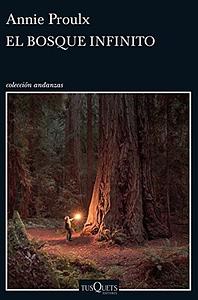You need to sign in or sign up before continuing.
Take a photo of a barcode or cover
Slow read. This story of several American families from the 1600s through modern days, all associated somehow with forests, logging, and land management had a great potential, but fell short in maintaining interest or sympathy for the characters.
Well, shoot. I wanted to love this book. I wanted to relish the impeccable writing of Annie Proulx and get lost in the story. The latter did happen, but not how I intended. I got lost in the generations and generations and generations and generations of timber folks, losing track of who is who and where they all were and why.
I understand the purpose of the book was to make the forests the central focus, to bring light to the approaches of the "whitemen" and Native Americans to our natural resources, especially our woodlands throughout North America. The work was historically incredible and the research astounding. But there were no central characters to embrace (or even completely loathe), no cohesive story to delve into. There was nothing to get passionate about.
I will still defend Proulx as an incredible writer and The Shipping News will always rank in my top 10 of all time. Barkskins was dull (for the most part), exhausting, frustrating, and overreaching.
I understand the purpose of the book was to make the forests the central focus, to bring light to the approaches of the "whitemen" and Native Americans to our natural resources, especially our woodlands throughout North America. The work was historically incredible and the research astounding. But there were no central characters to embrace (or even completely loathe), no cohesive story to delve into. There was nothing to get passionate about.
I will still defend Proulx as an incredible writer and The Shipping News will always rank in my top 10 of all time. Barkskins was dull (for the most part), exhausting, frustrating, and overreaching.
Proulx is such a terrific writer that the polemics in, and the multi-generational nature of, this long novel do nothing to detract from the story. She traces the history of forestry in North America through two intertwined families, both originating in the wilds of 17th century New France. As one family rises to prominence and wealth, the other, predominantly Mi'kmaq, suffers the decline and repression of native culture in the Northeast US and Canadian Maritimes. As someone who has ventured into what remains of the great North Woods, I could not help regretting the fact that I will never experience the primeval boreal forests that existed pre-European colonization when, it is said, a squirrel could start on the Atlantic coast and not leave the trees until he hit the Mississippi River.
Loved this book. Most of it, anyway. One of the clearest understandings, in novel form, of the way that european culture devastated and overtook native people's life and culture. And Proulx's chronicling of the european/christian notion that nature is here for human's use without regard for future generations. 300+ years of european conquest over the people and forests of north america.
About a quarter of the way in I decided that I just wasn't that interested. The writing is kind of blunt, and while the settling of Canada by the French is interesting and trade in the 17th and 18th c. is interesting, there was not enough momentum to keep me wanting to read. Alas. Maybe another time.
really long and none of the characters were very sympathetic or very personable. it was an interesting read of North American history
I like books where I learn something, and I did with this one--about the Mi'kmaq culture and the logging industry. I couldn't help but compare it to Homegoing, since it's a similar concept--it follows two people and their descendants up to the present day. However, Barkskins was a lot more focused on the effects of the people on the environment, rather than the people themselves. People would die horrible deaths and Proulx described them in a very offhand way. The white characters are all unlikeable, and while the Mi'kmaq characters are more sympathetic, they seem like just another victim of European culture, like the trees, rather than fully-formed human beings. In contrast, while Homegoing has fairly short sections on each person, the author sketches them in a way that you care about the characters and get a sense of them as individuals.
I loved parts of it and struggled with boredom through other parts. I think it was weighed down with too many extraneous details.
Fantastic history of North American forest "development" and a great multi-generational family saga.
As with every book of Annie Proulx's, I am humbled even as a reader by her incredible attention to detail and storytelling power. This could easily have been several books - it spans 300 years and follows generations with complex storylines in several countries. In an NPR interview, Proulx said the forest is the main character. The forest is central and inspires unwavering devotion by the various players who live, wither, thrive and die in pursuit of whatever life is to be had in and around trees. If I had a quibble, it's that the end of the book seems to peter out. The story of the descendants of Rene Sel, the man we root for and grieve at the beginning of the book, don't have as rich of a storyline by the time we meet them late in the 20th Century . They're boring on paper when I suspect they really aren't. Proulx on her worst day (and this book is by no means that) is better that so, so many. This is a masterpiece.
